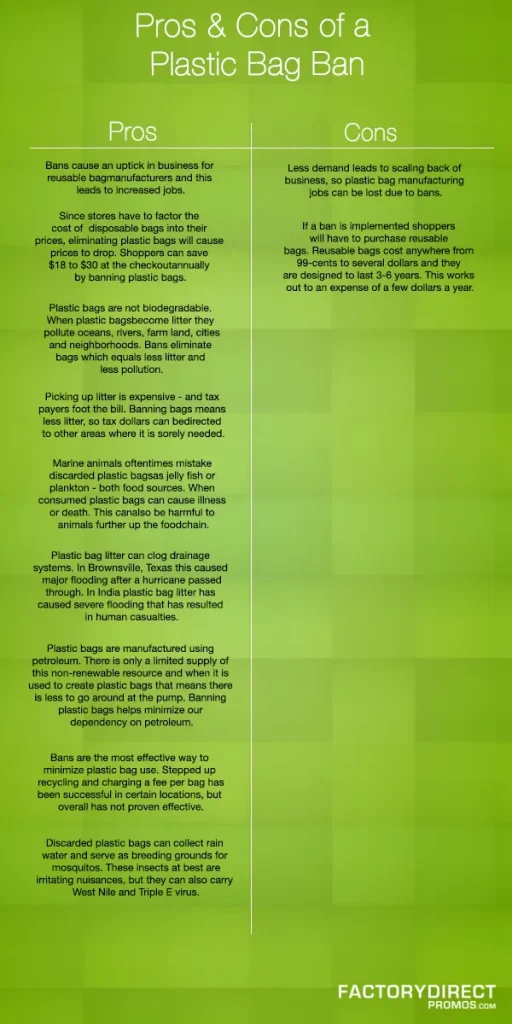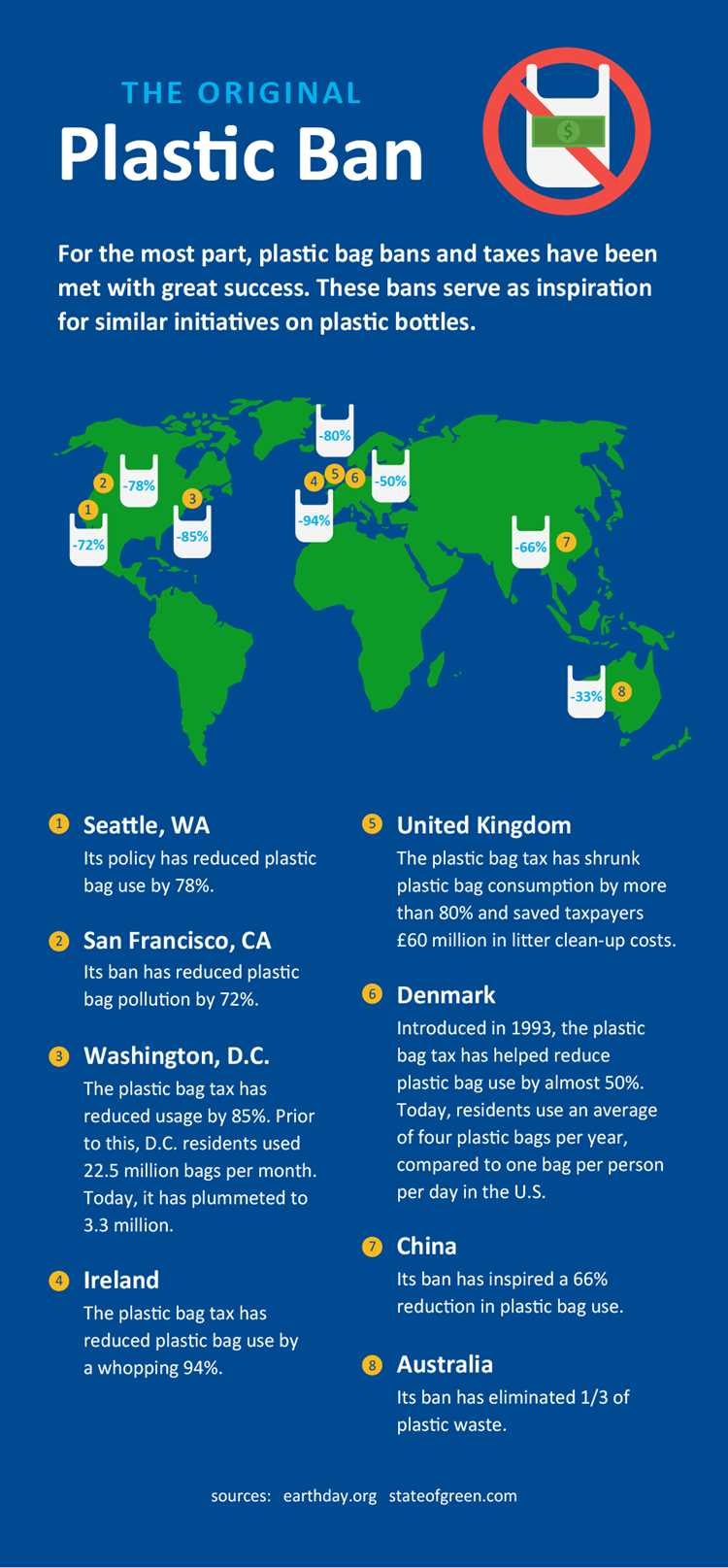
Plastic bags have become a ubiquitous part of our daily lives, but their impact on the environment cannot be ignored. Many countries and cities around the world have implemented bans or restrictions on the use of plastic bags in an effort to reduce pollution and protect ecosystems.
However, one common concern raised by skeptics is the potential cost of implementing and enforcing these bans. Critics argue that banning plastic bags could lead to increased costs for businesses and consumers, and could have a negative impact on the economy.
While it is true that banning plastic bags does require a shift in consumer behavior and may incur initial costs, there is evidence to suggest that in the long run, these bans can actually lead to cost savings.
One area where cost savings can be realized is in waste management. Plastic bags are a major contributor to litter and can take hundreds of years to decompose. By banning plastic bags, cities can reduce the amount of waste that ends up in landfills or in the natural environment, saving on the costs associated with waste collection, disposal, and cleanup.
- The Impact of Banning Plastic Bags on Cost Savings
- Environmental Effects of Plastic Bags
- Plastic bags also contribute to pollution and littering. When not properly disposed of, they can be carried by wind and end up in natural habitats, such as forests and parks. This not only affects the aesthetics of these areas but also disrupts the ecosystems and poses a threat to wildlife.
- Furthermore, the production of plastic bags requires the extraction of petroleum and natural gas, which leads to the destruction of land and habitats. This extraction process also contributes to air and water pollution, further damaging the environment.
- Costs Associated with Plastic Bag Production
- Alternatives to Plastic Bags
- Economic Benefits of Banning Plastic Bags
- Case Studies: Successful Plastic Bag Bans
- Rwanda
- San Francisco, USA
- Kigali, Rwanda
- Q&A:
- Do plastic bags really have a negative impact on the environment?
- What are the alternatives to plastic bags?
- Is banning plastic bags cost-effective?
- How do businesses benefit from banning plastic bags?
- What are some examples of places where plastic bags have been banned?
- Are plastic bags really that harmful to the environment?
The Impact of Banning Plastic Bags on Cost Savings
Banning plastic bags can have a significant impact on cost savings for both consumers and businesses. While the initial implementation of a ban may require some adjustment, the long-term benefits outweigh the short-term costs.
Reduction in production and disposal costs:
By banning plastic bags, governments and businesses can save money by reducing the production and disposal costs associated with these bags. The manufacturing of plastic bags requires fossil fuels and energy, which can be quite expensive. Additionally, the disposal of plastic bags is a costly process, as they do not biodegrade and require specialized recycling facilities.
Promotion of reusable alternatives:
Plastic bag bans often encourage the use of reusable alternatives, such as cloth or paper bags. While there may be a slight increase in the cost of purchasing these alternatives upfront, they can be used multiple times, leading to long-term cost savings. Reusable bags also tend to be more durable, reducing the need for frequent replacements.
Reduced litter and cleanup costs:
Plastic bags are notorious for their contribution to litter and environmental pollution. When plastic bags are banned, there is a significant reduction in litter, leading to lower cleanup costs for governments, businesses, and individuals. These savings can be substantial, as the cleanup of litter can be a costly and time-consuming process.
Healthcare cost savings:
Plastic bags pose health risks, especially when they end up in water bodies or are ingested by animals. By banning plastic bags, the risk of these health issues is reduced, resulting in long-term cost savings in healthcare. The prevention of these health risks can help alleviate the burden on healthcare systems and the associated costs.
Community and environmental benefits:
Banning plastic bags not only leads to cost savings but also brings about numerous community and environmental benefits. It helps in preserving natural resources, reducing greenhouse gas emissions, and promoting a cleaner and healthier environment for all. These long-term benefits far outweigh any initial costs associated with the implementation of a plastic bag ban.
In conclusion, the impact of banning plastic bags on cost savings is significant. By reducing production and disposal costs, promoting reusable alternatives, reducing litter and cleanup costs, and preventing health risks, the cost savings are evident. Additionally, the broader community and environmental benefits make the ban on plastic bags a worthwhile investment.
Environmental Effects of Plastic Bags
Plastic bags have become a huge environmental concern due to their negative impact on the environment. These bags are made from non-renewable resources, such as fossil fuels, which contribute to climate change. Additionally, the production of plastic bags requires a significant amount of energy and releases greenhouse gases into the atmosphere.
Once plastic bags are disposed of, they often end up in landfills, where they take hundreds of years to decompose. In the process, they release harmful chemicals into the soil and water, posing a threat to plants, animals, and humans. Plastic bags that are not properly disposed of can also end up in oceans and rivers, posing a hazard to marine life. Many marine animals mistake plastic bags for food, which can lead to injury or death.
Plastic bags also contribute to pollution and littering. When not properly disposed of, they can be carried by wind and end up in natural habitats, such as forests and parks. This not only affects the aesthetics of these areas but also disrupts the ecosystems and poses a threat to wildlife.
Furthermore, the production of plastic bags requires the extraction of petroleum and natural gas, which leads to the destruction of land and habitats. This extraction process also contributes to air and water pollution, further damaging the environment.

It is important to address the environmental effects of plastic bags and find sustainable alternatives to reduce their usage. By implementing bans or levying taxes on plastic bags, we can encourage individuals to switch to reusable options, such as cloth or paper bags. These alternatives have a lower environmental impact and can help protect our planet and its ecosystems.
Costs Associated with Plastic Bag Production
Plastic bag production involves several costs that can have a negative impact on the environment, economy, and public health.
1. Raw materials: The production of plastic bags requires the extraction of natural resources, such as petroleum or natural gas, to obtain the raw materials needed for manufacturing. This extraction process has its own environmental costs, including habitat destruction, water pollution, and greenhouse gas emissions.
2. Manufacturing: The manufacturing of plastic bags involves energy-intensive processes that contribute to greenhouse gas emissions. These emissions contribute to global warming and climate change, which have long-term costs associated with them, such as extreme weather events and rising sea levels.
3. Transportation: Plastic bags need to be transported from the manufacturing facilities to various distribution points, such as grocery stores. This transportation requires fuel, which adds to the overall carbon footprint of plastic bags and contributes to air pollution.
4. Waste management: Plastic bags are frequently discarded after single use, leading to significant waste management costs. These costs include collection, sorting, transportation, and disposal of the bags. In many cases, plastic bags end up in landfills or as litter in the environment, causing additional negative environmental impacts.
5. Environmental impact: Plastic bags have a detrimental impact on wildlife and ecosystems. Marine animals often mistake plastic bags for food, leading to ingestion and entanglement. This can result in injury or death for these animals, disrupting entire ecosystems.
6. Health costs: Plastic bags can pose health risks to humans. They can leach harmful chemicals when exposed to high temperatures, contaminating food or water. These chemicals, such as Bisphenol A (BPA), have been linked to various health issues, including hormone disruption and developmental problems.
In conclusion, the production of plastic bags has significant costs associated with it, including environmental, economic, and health impacts. By banning plastic bags, we can potentially reduce these costs and promote a more sustainable and environmentally friendly society.
Alternatives to Plastic Bags
With the increasing awareness about the environmental impact of plastic bags, many alternatives have been developed as a more sustainable option. These alternatives are aimed at reducing plastic waste and promoting a greener future. Some of the most popular alternatives to plastic bags include:
- Reusable Cloth Bags: These bags are made from durable fabrics such as canvas or cotton and can be used multiple times. They are typically stronger and can hold more items than plastic bags.
- Paper Bags: Paper bags are a biodegradable option and can be easily recycled. However, they may not be as durable as plastic bags and may tear if they get wet.
- Biodegradable Plastic Bags: These bags are made from materials that can break down naturally over time. While they are still made from plastic, they are designed to be more environmentally friendly.
- Compostable Bags: Made from natural materials such as cornstarch, compostable bags can break down completely in composting facilities, leaving behind no harmful residue.
- Mesh Produce Bags: These bags are specifically designed for carrying fruits and vegetables. They are reusable, lightweight, and allow produce to breathe.
It is important to note that while these alternatives may be more sustainable than plastic bags, they still come with their own environmental considerations. The production and disposal of these alternatives still require resources and energy. Ultimately, the best solution is to reduce overall bag consumption and encourage the use of reusable bags whenever possible. By making small changes in our daily lives, we can help protect the planet for future generations.
Economic Benefits of Banning Plastic Bags

Plastic bags have long been a staple of the retail industry, but their negative impact on the environment and human health is becoming increasingly apparent. As a result, many countries and cities are considering or have already implemented bans on plastic bags. While there are some upfront costs associated with transitioning to alternative options, banning plastic bags can ultimately lead to significant cost savings.
One of the most immediate economic benefits of banning plastic bags is a reduction in waste management costs. Plastic bags are not easily recyclable and often end up in landfills or as litter in the environment. The cost of collecting, sorting, and disposing of these bags can be quite substantial. By eliminating plastic bags, municipalities can save on these waste management expenses.
Furthermore, banning plastic bags can lead to a decrease in litter cleanup costs. Plastic bags are notorious for becoming airborne and littering streets, parks, and waterways. Local governments and organizations spend a significant amount of money and resources on cleaning up this litter. By reducing the number of plastic bags in circulation, the need for ongoing litter cleanup efforts can be greatly reduced.
Another economic benefit of banning plastic bags is the potential for stimulating the local economy. When plastic bags are banned, consumers are encouraged to use reusable alternatives such as cloth bags or paper bags. This creates a demand for these products, which in turn can support local businesses and manufacturers. Additionally, the production and disposal of plastic bags require a significant amount of energy and resources. By eliminating or reducing the use of plastic bags, there is potential for energy savings and reduced environmental impact.
Finally, banning plastic bags can have long-term cost savings in terms of environmental and health impacts. Plastic bags are made from petroleum, a non-renewable resource, and their production contributes to carbon emissions and air pollution. Banning plastic bags can help reduce the reliance on fossil fuels and mitigate climate change. Additionally, plastics can take hundreds of years to decompose, leading to pollution in soil and water. By reducing the use of plastic bags, communities can help protect their natural resources and reduce environmental remediation costs.
In conclusion, while there may be some upfront costs associated with banning plastic bags, the potential economic benefits far outweigh these initial expenses. Reductions in waste management costs, litter cleanup efforts, and environmental impacts can ultimately result in significant cost savings for municipalities. Moreover, supporting local businesses and manufacturers through the use of reusable alternatives can stimulate the local economy. By taking steps to ban plastic bags, communities can create a more sustainable and economically viable future.
Case Studies: Successful Plastic Bag Bans
Plastic bag bans have been implemented successfully in a number of cities and countries around the world. These bans have not only contributed to reducing plastic waste and protecting the environment but have also resulted in significant cost savings. Here are some case studies highlighting successful plastic bag bans:
Rwanda
In 2008, Rwanda became one of the first countries in the world to implement a nationwide ban on plastic bags. The government took a strong stance against plastic waste and imposed heavy fines for manufacturing, importing, or using plastic bags. As a result, Rwanda has seen a drastic reduction in plastic waste pollution and has become one of the cleanest countries in Africa. The ban has also resulted in cost savings for the government in terms of waste management and environmental cleanup.
San Francisco, USA

San Francisco implemented a ban on single-use plastic bags in 2007, becoming the first city in the United States to do so. The city saw an immediate decrease in plastic bag usage, and residents quickly adapted to using reusable bags. As a result, the city has significantly reduced its plastic waste, leading to lower costs associated with waste management and landfill usage. The ban also created a market for reusable bag manufacturing, supporting local businesses and creating jobs.
Kigali, Rwanda
Kigali, the capital city of Rwanda, implemented a plastic bag ban in 2006 ahead of the national ban. The city introduced a comprehensive waste management system and educated residents about the environmental impact of plastic bags. As a result, Kigali became one of the cleanest cities in Africa and saw a drastic reduction in plastic waste. The ban has led to cost savings for the city in terms of waste management, litter cleanup, and the negative impact on public health.
These case studies demonstrate that banning plastic bags can be an effective and cost-saving measure for cities and countries. The reduction in plastic waste and associated cleanup costs, along with the creation of new industries, can offset any initial expenses involved in implementing the ban. It’s clear that plastic bag bans can be a win-win solution for both the environment and the economy.
Q&A:
Do plastic bags really have a negative impact on the environment?
Yes, plastic bags have a significant negative impact on the environment. They are not biodegradable and take hundreds of years to break down, causing pollution and harming wildlife.
What are the alternatives to plastic bags?
There are several alternatives to plastic bags, such as reusable cloth bags, paper bags, or biodegradable bags made from materials like cornstarch. These alternatives are more eco-friendly and can be used multiple times before being disposed of.
Is banning plastic bags cost-effective?
Yes, banning plastic bags can lead to cost savings in the long run. While there may be initial costs associated with implementing the ban, such as providing reusable bags or educating the public, the reduction in environmental damage and clean-up costs outweigh these expenses.
How do businesses benefit from banning plastic bags?
Businesses can benefit from banning plastic bags as it reduces their expenses for providing bags to customers. By encouraging the use of reusable bags, businesses can also build a positive brand image and attract eco-conscious customers.
What are some examples of places where plastic bags have been banned?
Plastic bag bans have been implemented in various places around the world. Some examples include California, Hawaii, Rwanda, Kenya, and Bangladesh. These bans have successfully reduced plastic waste and promoted the use of more sustainable alternatives.
Are plastic bags really that harmful to the environment?
Yes, plastic bags are incredibly harmful to the environment. They are made from non-renewable resources like petroleum, and they take hundreds of years to break down in landfills. Additionally, many plastic bags end up in the ocean, where they harm marine life and contribute to pollution.